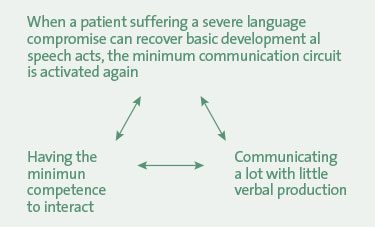

Recovering minimum communication circuits
Definition and characteristics
A new project, ICRA-R Battery (Communicative Competence Research for Speech Acts Recovery), emerged from the experience of applying the speech act concept at an early age in patients with difficulties in developing their communicative competence.
It is implemented in patients of any age who, after developing language, have a severe language compromise caused by physical damage or degenerative pathologies affecting the dynamics of basic communication for interaction.
It focuses on the assessment and therapeutic approach of eight basic speech acts:
• Asserting
• Rejecting
• Calling
• Greeting
• Requesting (an object)
• Requesting (action)
• Requesting (information)
• Giving information
Specific PRAGMATIC FEATURES related to Paralinguistic Production, Linguistic Production and Verbal and Nonverbal Coherence are analyzed in each speech act.
Definition and characteristics
These basic speech acts embody the minimum communicative intent essential for interaction. Indeed, requesting an object or an action from another person, calling someone, asking a question, rejecting, giving minimum new information, as well as greeting or asserting are always located at the foundations of the communicative dynamics of human linguistic performance.
ICRA-A Battery
OPENING THE MINIMUM COMMUNICATION CIRCUIT
ICRA-R Battery
RECOVERING THE MINIMUM COMMUNICATION CIRCUIT
Basic speech acts prioritize the functionality of language.

ICRA-R Battery is supported by the concepts that lay the foundations of ICRA Method, from which pragmatic therapeutic goals are also outlined.
ICRA-R Battery is under a process of validation. It is carried out within the framework of an Outreach Agreement between CONICET’s CIIPME Institute and the Research Department of Hospital Italiano Buenos Aires.